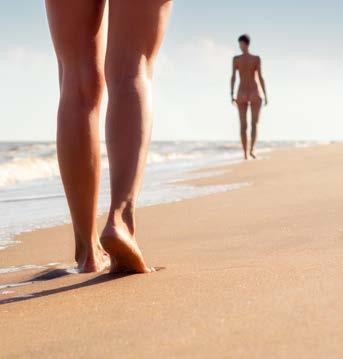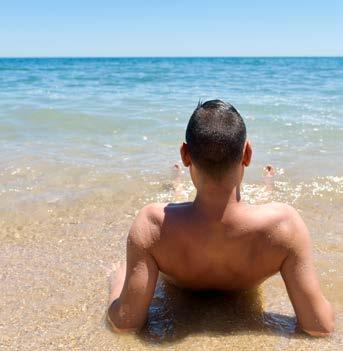
4 minute read
Naturist camping
Naturism is the freedom of getting back to nature, enjoying the elements on your skin and not having to worry about squeezing into last year’s swimming costume. Or indeed any clothes at all. Naturist campsites are friendly places where you are entirely safe to let your guard down and relax.
Naturist camping holidays are a breath of fresh air for those who enjoy them, places where you can cast off anxieties about appearance and body image among like-minded visitors. The UK’s national organisation British Naturism bn.org.uk has many years experience of encouraging and celebrating the naturist way of life and hears so much positive feedback from those who have decided to take the plunge. Spending time immersed in the outdoors and surrounded by nature brings enormous benefits, a boost to physical, psychological and emotional wellbeing. Laid-back communal nudity is also a great way to meet people in an unhurried and respectful way, a shared moment of humanity where everyone is on a level.
Feeling the sunshine, fresh air and water all over is a wonderful experience of wellbeing and freedom. The simple act of arriving and stripping off is a great way to cast off the trappings and pressures of ordinary life. Researchers are discovering something that naturists have known for decades: it is particularly good for improving your body image.

Long before the invention of the swimming costume, people stripped off to bathe outdoors without a second thought.
Naturists continue to do so today, gathering at campsite pools and beaches to enjoy the timeless pleasure of skinny dipping. So if you’ve ever felt the urge to throw caution – along with everything else – to the wind, these campsites have got naturism down to a fine art.
Naturist Campsites
Many of our listed sites are set apart in beautiful woodland or beside dedicated nude beaches, making them ideal for visitors who are new to nudism. As any experienced naturist camper will tell you, they are also the perfect setting in which to make friends with like-minded individuals and relax in a welcoming environment.

naturist terms
Naturist or nudist?
If your favourite holiday outfit is your birthday suit, then you can call yourself a naturist or nudist as you prefer. The dress code certainly looks the same when practised on a sunny beach. But as naturists might tell you, the joys of stripping off go rather more than skin deep.Naturism arose as a philosophy around 100 years ago in response to the increasing stresses of everyday life and as a reaction against rules that restricted people from bathing naked outdoors.
Nudism means choosing to go nude where others might prefer to button up, but naturists take it one step further to feel connected to nature and their own bodies. It has emotional, spiritual and social benefits, an emphasis on all-over wellbeing.
Clothing optional
In practice, nearly every naturist campsite is clothing optional to a degree, particularly in the evenings, although all of them would discourage any form of swimming costume. Clothing optional generally means the site is relaxed about what you choose to wear or not wear.
Free beach
A nude beach is sometimes referred to as a free beach. These are places where nudity is well established and accepted, either through official designation or by a long-term history of nude bathing. Traditional naturism is respectable and safe, and police will only intervene to cut down on antisocial behaviour.
FKK
When it comes to organised naturist sites, Germans certainly got there first, unrolling their towels to practice what was initially labelled Freikörperkultur, or ‘free body culture’. Appealing to equal numbers of men and women and with an emphasis on communal nudity as a healthy way to exercise and mingle with others, the movement spread rapidly from its origins in the city of Essen in 1898.
The FKK movement believed that bodily embarrassment and shame were unnatural and unhealthy, and demonstrated it was possible to celebrate rather than denigrate nakedness. FKK followers in time became known as naturists or nudists, and the movement rapidly spread.
INF
The International Naturist Federation combines member federations from over forty countries. The aim is to improve the naturist experience by developing a better understanding of the benefits of naturism among the general public. It also helps to advocate for the rapidly growing naturist travel market, which attracts millions of tourists each year.
Textile
Quite simply, the opposite of nudist. A ‘textile’ is how a naturist might refer to someone who chooses to wear clothes for swimming and sunbathing. Types of campsite are therefore sometimes described as naturist or textile sites to underscore the difference.
Topless or top free?
Meaning much the same thing, these are ordinary beaches where women, as well as men, are free to strip off their upper body, essentially where women can go without their bikini top. Unlike naturist places, however, the lower half of the body is kept covered up.
Nakation
A nakation is simply a nude vacation, a reasonably new term that long-established naturists rarely use. But that underlines the point: you don’t need to consider yourself a committed naturist to join in. Naturism is there for anyone willing to join in and respect the traditional and well-established way of enjoying a holiday to the full.
Browse over 100 naturist sites at alanrogers.com/naturist








